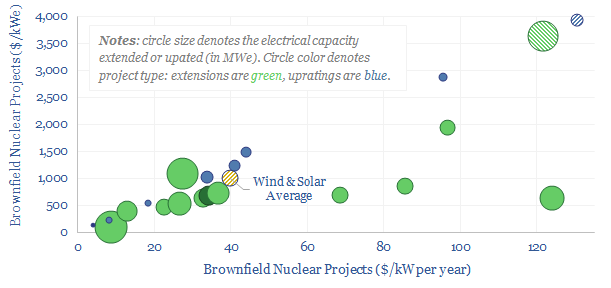What are the costs of nuclear life extensions and capacity upratings? This data-file has reviewed 25 examples, from past projects and technical papers. The average nuclear life extension costs around $650/kW to extend a nuclear plant’s life by 20-years, or around $30/kW-year.
These cost estimates are interesting as extending the life of a new nuclear plant costs around 80-90% less than constructing a new one. It also costs around 25-50% less than constructing new wind and solar, using a rounded $1,000/kWe ballpark.
Increasing the capacity of a nuclear plant costs an average of $1,250 per kWe of added capacity. Again, this is 60-80% less than the costs of constructing a new nuclear plant from scratch.
However the numbers are extremely variable and range from c$100/kW at the simplest projects, for example, fitting new instrumentation to optimize water-flow through an existing reactor; through to $4,000/kW at major projects that effectively re-build an entire reactor, piece-by-piece.
Our outlook for nuclear is that life extensions will become much more prevalent. Effectively, shutdowns are likely to stall in the 2020s, resulting in a nuclear CAGR of at least 3% through 2030 and 2.5x ramp through 2050. A nuclear renaissance is clearly helpful for energy transition and resolving energy shortages.
Implications are constructive for nuclear and for large-scale EPC companies. Companies that have delivered past life extension projects in the nuclear industry include Bechtel, SNC Lavalin, Black and McDonald, Jacobs, GE, Westinghouse.
The data-file covers 25 nuclear life extensions and capacity upratings, their costs, and a concise summary of project details. Projects are featured from the US, Canada, Mexico, Europe, Japan and South Africa.

